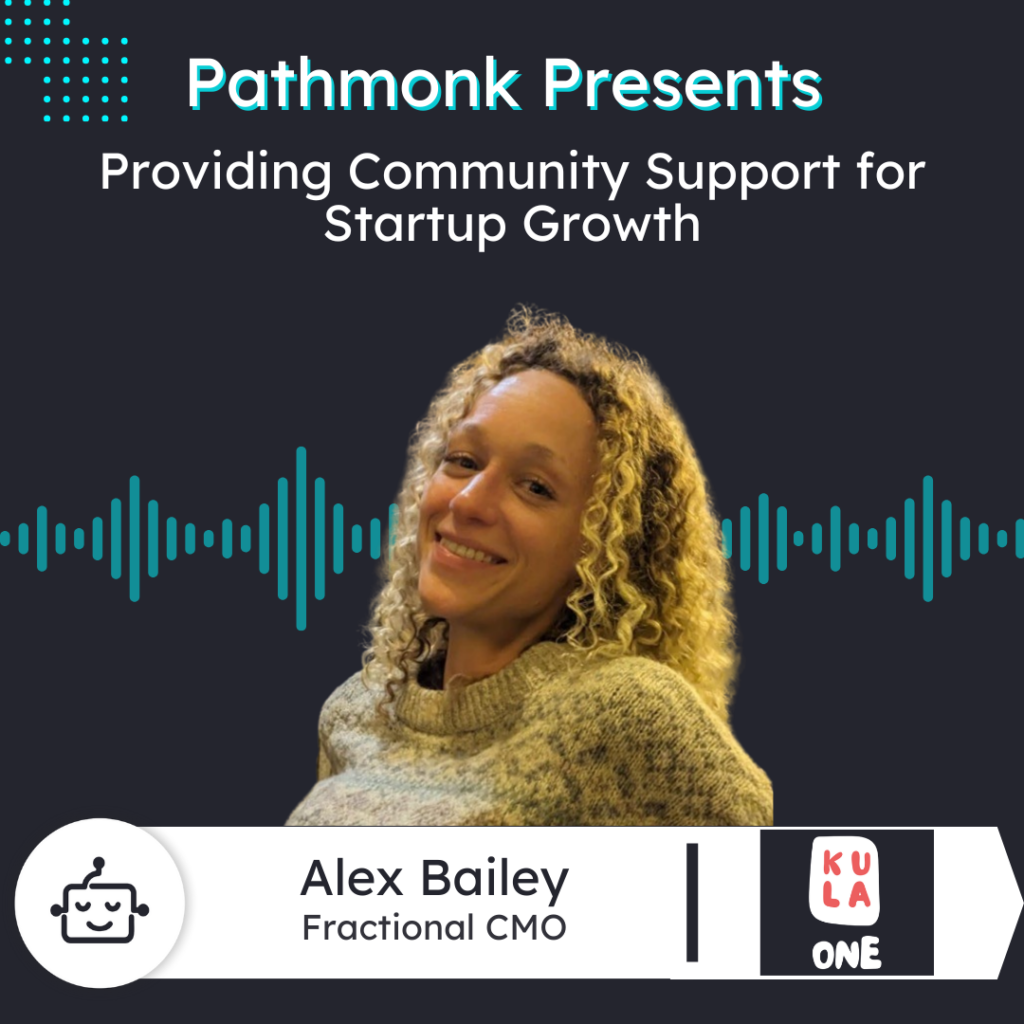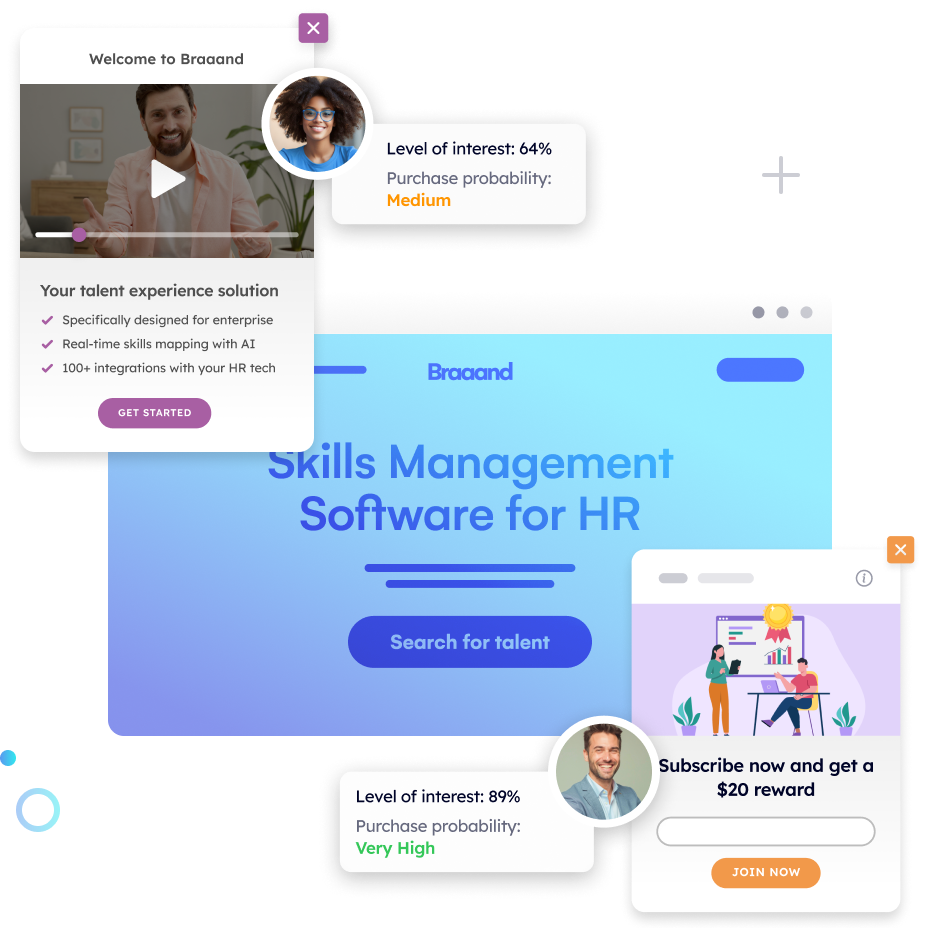
Introduction
Meet Alex Bailey, a fractional CMO and co-founder of Kula One, a community of experts providing support for growing startups.
Alex shares her insights on the benefits of fractional support, the importance of building a strong website, and the challenges faced by startup founders.
She also discusses how Kula One helps startups achieve sustainable growth while prioritizing a healthy work-life balance.
Increase +180% conversions from your website with AI
Get more conversions from your existing traffic by delivering personalized experiences in real time.
- Adapt your website to each visitor’s intent automatically
- Increase conversions without redesigns or dev work
- Turn anonymous traffic into revenue at scale

Rick Veronese: Pathmonk is the AI for website conversions. With increasing online competition, over 98% of website visitors don’t convert. The ability to successfully show your value proposition and support visitors in the buying journey separates you from the competition online. Pathmonk qualifies and converts leads on your website by figuring out where they are in the buying journey and influencing them in key decision moments with relevant micro experiences like case studies, intro videos, and much more. Stay relevant to your visitors and increase conversions by more than 50%. Add Pathmonk to your website in seconds, let the artificial intelligence do all the work, and increase conversions while you keep doing marketing as usual. Check us out on Pathmonk.com. All right, welcome everybody to today’s episode of Pathmonk Presents. Today, we are joined by Serial Head of Marketing, queen of the rebrand, and co-founder of Kula One, Alex. Hey Alex, how’s it going?
Alex Bailey: Hey, hi, I’m doing well, thanks. How are you?
Rick: Yeah, doing well, thank you. Doing well. So Alex, I just mentioned Kula One, but you’re better than me at describing it to myself and the audience. Can you introduce Kula and basically tell us what’s at the heart of what your company does? How would you describe it to someone who’s come across it for the first time?
Alex: Yeah, no worries. So Kula One is essentially a community of fractional problem-solvers that exists as a flexible resource for growing startups to tap into. We’re the Swiss army knife of startup and scale-up experts. It’s a mixture of senior leadership support and teams that can be utilized by startups to get the right support and advice they need at crucial stages of their growth journey.
To paint a picture of that, as a founder, you might need to build a marketing function from scratch. You might have built a really cool product already, but you haven’t done any marketing and you’re not sure where to start. You might want to bring in a fractional CMO initially, one day a week, to get that started. You might need to level up your finance game or put in systems and processes because you’ve reached a stage where what you started with isn’t scalable in the long run. Or it might be a combination of any of those things.
The idea of Kula is that we’re that one-stop shop for all your growing pains as a startup. Everyone in our group has been around the block and has dealt with these challenges personally before. When you’re just starting out, you might benefit from talking to an experienced operator, but you might not have the budget to hire a full-time senior leadership team member, if that makes sense.
And just to add context to why we exist—hustle culture is outdated now. It’s not working. People are burning out, quietly quitting, or just quitting altogether. Kula is part of the movement toward more sustainable startup growth. We believe in balance in business and redefining success. Spoiler alert—it’s not about growth or revenue at all costs. It’s about protecting the humans behind the success of the startup. That’s at our core.
Rick: Okay, I love that. Making it more human-centered will attract the type of businesses you want to work with. They’ll see right away that’s how you operate. I guess they either adapt to it or you’ll work with companies whose cultures align with your way of doing things. That’s beautiful, honestly. And yes, hustle culture has done its time. We’ve seen it, done that. Now, let’s find sustainable ways to grow businesses and make a difference.
Which types of businesses or industries do you feel you’re able to serve best, having that in mind? What kind of problems are you solving for them, and what can they expect when they come to you?
Alex: Absolutely. Our sweet spot is tech startups with around 10 to 30 employees, probably a couple of years old, who’ve nailed their product-market fit. Typically, it’s a tech founder who’s great at building a product but may lack experience in other areas of running a business. They’re often on the verge of big growth and just need a helping hand.
In terms of key problems, startups don’t have a lot of money. They can’t afford full-time senior staff, so they need financial flexibility. They also need different types of expertise because things change fast in a growing startup. It might be a marketing challenge one day and an HR challenge the next. The ability to tap into a group for varying expertise as needed is hugely beneficial.
Another problem is not knowing how to vet the right people. At Kula, everyone is kind, emotionally intelligent, and down-to-earth. That human touch is critical, especially as AI rises and other skills become less relevant. So, those are the key problems we solve.
Rick: That’s great. So when people reach out to you—likely someone from the founding team like the CEO or co-founder—how do they typically find you?
Alex: That’s a great question and something we’re still figuring out. We’re creating the market for fractional startup expertise in the UK. A big way we make headway is through content—shouting about it on LinkedIn, networking at startup events online and in person, and leveraging word of mouth. Referrals are huge for us. We’d love our website to play a bigger role, but since it’s a new niche, SEO isn’t driving much yet. It’s definitely a work in progress.
Rick: Sounds like you have to be scrappy at the beginning. Referrals are key when starting out. You mentioned your website earlier. What role does a website play in attracting clients?
Alex: The website is super important. It’s not just a place to convert leads; it’s your story and brand. It’s the first thing people see when they type you into Google. For startups, you need specific landing pages for different products and services tailored to various customer needs. Right now, Kula’s website is just a splash page, but we plan to add more products and services. A good website is crucial for conversion.
Rick: Absolutely. What about tools? What are your top three tools as a CMO?
Alex: HubSpot, hands down. It’s my one-size-fits-all tool—it does everything. From tracking leads and engagement to managing long-term relationships, it’s invaluable.
Rick: Perfect. Let’s talk about you as a leader. What are your key tasks day-to-day?
Alex: It’s super varied. A lot of my time goes into talking and listening to people—coaching, problem-solving, and helping them develop their skills. I attend networking events, manage admin tasks, and spend time on LinkedIn. It’s a mix of strategic and operational tasks.
Rick: Sounds great. Let’s jump into rapid-fire questions. Short answers only. Ready?
Alex: Let’s go!
Rick: What’s the last book you read?
Alex: Kafka on the Shore by Murakami.
Rick: What’s the one thing your company is focused on the most?
Alex: Developing a human experience squad focused on brand, customer, and employee experience.
Rick: If there were no boundaries in technology, what’s one thing you’d fix for your role?
Alex: Knowing when founders are struggling the most, even when they’re too overwhelmed to ask for help.
Rick: What’s one repetitive task you’d automate?
Alex: Sorting and prioritizing emails intelligently.
Rick: What’s one piece of advice you’d give your younger self?
Alex: Never take anything personally.
Rick: Beautiful. Alex, thanks so much for being on the show. If someone forgets everything, what’s one thing they should remember about Kula One?
Alex: We’re fractional expertise with heart. If you or someone you know is a struggling startup founder, check out our website!
Rick: Perfect. Thanks again, Alex. Looking forward to having you on again soon!



